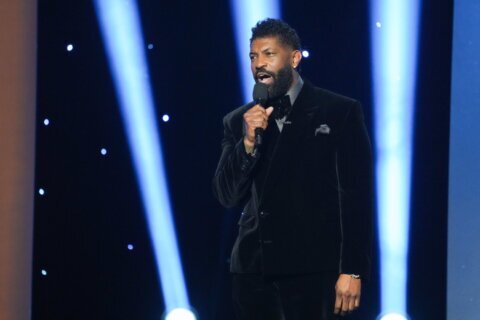Today’s generation is devouring “Stranger Things” for its 1980s bike-riding culture, but that nostalgia comes from the most immortal children’s movie ever.
On Aug. 2, relive the magic of Steven Spielberg’s “E.T. the Extra-Terrestrial,” accompanied live by the National Symphony Orchestra at Wolf Trap.
“This is one of the great films in Hollywood history,” conductor Emil de Cou said. “It’s a terrific way to spend time with friends, loved ones, family and neighbors. …You get this gigantic screen, the best sound system in the world, one of the great films in the film history. It’s a great way to introduce young people to the sound of a live symphony orchestra for the first time. It’s something you’ll never forget.”
Movie concerts have taken off since the first Hitchcock show at Wolf Trap in 2000.
“It’s only in the past 10 years where major-release films have been presented live in concert,” de Cou said. “People can discover this great music for the first time the way it’s supposed to be heard. For years, people had done ‘Lawrence of Arabia,’ ‘E.T.,’ ‘Wizard of Oz,’ ‘Gone with the Wind’ without the film because the music is so great. But to combine it with the actual film and hear the orchestra the way it was meant to be heard, you can only hear it this way at these concerts.”
It’s especially exciting to hear the musical genius of film composer John Williams.
“This score is probably his most popular,” de Cou said. “Spielberg meant it as a break from ‘Raiders’ and ‘Close Encounters’ to make a real sensitive love story … from his childhood perspective. The music is really important because it has to portray the inner feelings of both Elliot and E.T. from a child perspective.”
While most directors edit the film down to a finalized “picture lock” then have the composer compose the music to match it, Spielberg did the opposite in “E.T.”
“When he conducted that famous end he couldn’t line it up with the film the way Spielberg had cut it,” de Cou said. “He tried over and over again watching a giant screen the way they did in the 1940s conducting an orchestra live recording it. … So, Spielberg said, ‘Turn off the film and just record the music.’ So he recorded the last 12 or 14 minutes of the film and then Spielberg recut the film to match it.”
He realized the difference while preparing for a recent Kennedy Center concert.
“I was in the Kennedy Center Concert Hall by myself just doing a tech rehearsal with no one there just running the film without the music,” de Cou said. “They showed the whole end of the film and it wasn’t that moving or extraordinary. Then that night with the live music, it just transformed everything. Everyone was in tears, as you should be if you watch ‘E.T.’ It was just absolutely transformative to show what music can do — and I think it’s because the music came first.”
He insists the movie score is as sophisticated as revered classical music.
“Studying these scores, it’s absolutely masterful how he puts these things together,” de Cou said. “It’s incredibly well crafted. E.T.’s theme is from an old Gregorian church mode, so it sounds somewhat familiar but also exotic and otherworldly. On top of that, he adds different harmonies, like playing the black keys and white keys on the piano at the same time. It’s amazingly sophisticated … how he paces all the tunes and how he plants little seeds along the way.”
Where does he rank the “E.T.” score among all of Williams’ iconic themes?
“For me, personally, it’s way at the top,” de Cou said. “‘Star Wars’ is probably his most famous — it’s a great film and great music — but it’s kind of a throwback to Buck Rogers, it’s slightly spoofish. But with ‘E.T.’ it’s all about the tremendous heart and this love between this boy and this alien, who are both kind of lost in their own way and they find each other. Everything about it rings true.”
The truth comes from Spielberg’s own childhood amid his parents’ divorce.
“It’s a coming-of-age story,” de Cou said. “He doesn’t have a lot of other friends. Elliot is painted as not quite a loner but just by himself. … He finds this friend, this alien, and they’re on a journey quest to get him back to where he belongs. … Every little kid would love to be Elliot in the San Fernando Valley, to have this special friend who can do all these magical things, levitate balls, go to Halloween. … What better fantasy than just riding your bike so fast that it flies into the air?”
Such universal themes really connected with audiences, making it the top-grossing film ever upon its release. Adjusted for inflation, “E.T.” remains No. 4 all time, well ahead of this year’s big blockbuster “Avengers: Endgame” at No. 16.
“It’s a like a kid wrote and directed this film because it has that sense of wonder and innocence without going too far, explaining too much or trying too hard,” de Cou said. “It’s one of the perfect films for me in every way. … Growing up in L.A. in the late ’70s, watching a movie set in the San Fernando Valley in an unfinished housing track, that’s what my childhood looked like, minus the aliens and cool kids.”
You can hear more from de Cou in the preshow talk on the Farmhouse Lawn at 7:30 p.m. with Dr. Mary Voytek, senior scientist for astrobiology at NASA.
“We have a scientist from NASA talking about, what else, aliens,” de Cou said.
Don’t worry, if you need directions to Wolf Trap, just follow the Reese’s Pieces.
Find more details by visiting the Wolf Trap website.
Hear our full chat with conductor Emil de Cou below:







